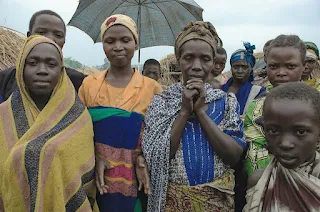Christianity and Colonial Oppression: The Congo Simba Uprising of 1964-1965
Christianity and Colonial Oppression: The Congo Simba Uprising of 1964-1965
The Simba Rebellion in the Democratic Republic of Congo (1964-1965) represents a critical moment where Christianity became entangled with colonial politics, leading to tragic consequences for missionaries and Congolese Christians alike. This complex historical episode reveals how religious institutions became perceived as complicit in colonial oppression.

Key Facts: The Simba Rebellion
Duration: 1964-1965
Location: Democratic Republic of Congo
Casualties: Approximately 250,000 Congolese
Missionary Deaths: 27 missionaries, 200+ nuns and priests
Context: Post-independence power struggle
The Colonial Legacy: Christianity as Complicit Power
During the Congo Simba Uprising, Christianity was widely perceived as complicit in colonial oppression, leading many Catholic leaders and missionaries to become targets of rebel violence. This perception stemmed from the historical association between Christian missions and European colonial administrations throughout Africa.
The Democratic Republic of the Congo experienced the impact of European colonialism and the spread of Christianity as part of that process. Many Congolese people came to associate Christianity directly with colonialism and foreign domination, creating deep-seated resentment that would surface during the rebellion.
Patrice Lumumba's Legacy and Religious Tensions
Patrice Lumumba's vision for a unified and independent Congo significantly influenced the political landscape that gave rise to the Simba Rebellion. His relationship with the Catholic Church was particularly tense, as he recognized both the positive aspects of Christian ethics and the problematic role Christian institutions had played during colonial rule.
Lumumba advocated for a secular state where religion, including Christianity, would not play a dominant role in governance. He argued for the separation of church and state, believing this would best serve the interests of all Congolese people regardless of their religious beliefs.
Patrice Lumumba
Role: First Prime Minister of independent Congo
Position: Advocate for secular government
Legacy: Symbol of African independence
Simba Rebels
Motivation: Anti-colonial, anti-Western
Targets: Religious leaders, foreign interests
Ideology: African nationalism
Christian Missions
Historical Role: Education, healthcare services
Perception: Associated with colonial power
Casualties: Hundreds of religious workers
The Stanleyville Hostage Crisis
One of the most dramatic episodes of the Simba Rebellion was the Stanleyville Hostage Crisis (also known as the Stanleyville Massacre). In November 1964, rebels attacked mission stations across the region, capturing numerous missionaries including British doctor Helen Roseveare.
Roseveare, known as Mama Luca, documented her harrowing experiences in her autobiography "Give Me This Mountain." She and several other missionaries were held captive for months before being rescued in early 1965 by a joint operation of Belgian paratroopers, US forces, and Katangese gendarmes.
Chronology of Key Events
Congo gains independence from Belgium; Patrice Lumumba becomes first Prime Minister
Lumumba assassinated, creating political martyr and symbol of resistance
Simba Rebellion begins; rebels target Christian institutions seen as colonial collaborators
Stanleyville Hostage Crisis; missionaries including Helen Roseveare captured
Rebellion suppressed; estimated 250,000 Congolese dead
Religious Dimensions of the Conflict
Religion played a complex role in the Simba Rebellion. Many rebel leaders framed their struggle in religious terms, seeing themselves as righteous defenders of their homeland and traditional beliefs against foreign exploitation and oppression.
The rebels specifically targeted religious leaders—both Catholic priests and Protestant pastors—because these figures held significant moral authority in Congolese society. By attacking these symbols of foreign influence, the rebels sought to assert African cultural and religious identity while opposing what they perceived as colonial continuation through religious institutions.
The historical relationship between the Catholic Church and Belgian colonial authorities particularly influenced rebel perceptions. During the colonial period, the Church had provided essential services like education and healthcare, but this work was often conducted in close alignment with colonial administration goals.
Frequently Asked Questions About Christianity and the Simba Uprising
The Simba Rebellion of 1964-1965 represents a tragic chapter where religious faith became entangled with political conflict. The perception of Christianity as complicit in colonial oppression—whether accurate or oversimplified—had devastating consequences for missionaries and Congolese Christians alike. This historical episode continues to raise important questions about the relationship between religious missions, colonial power, and African independence movements.






